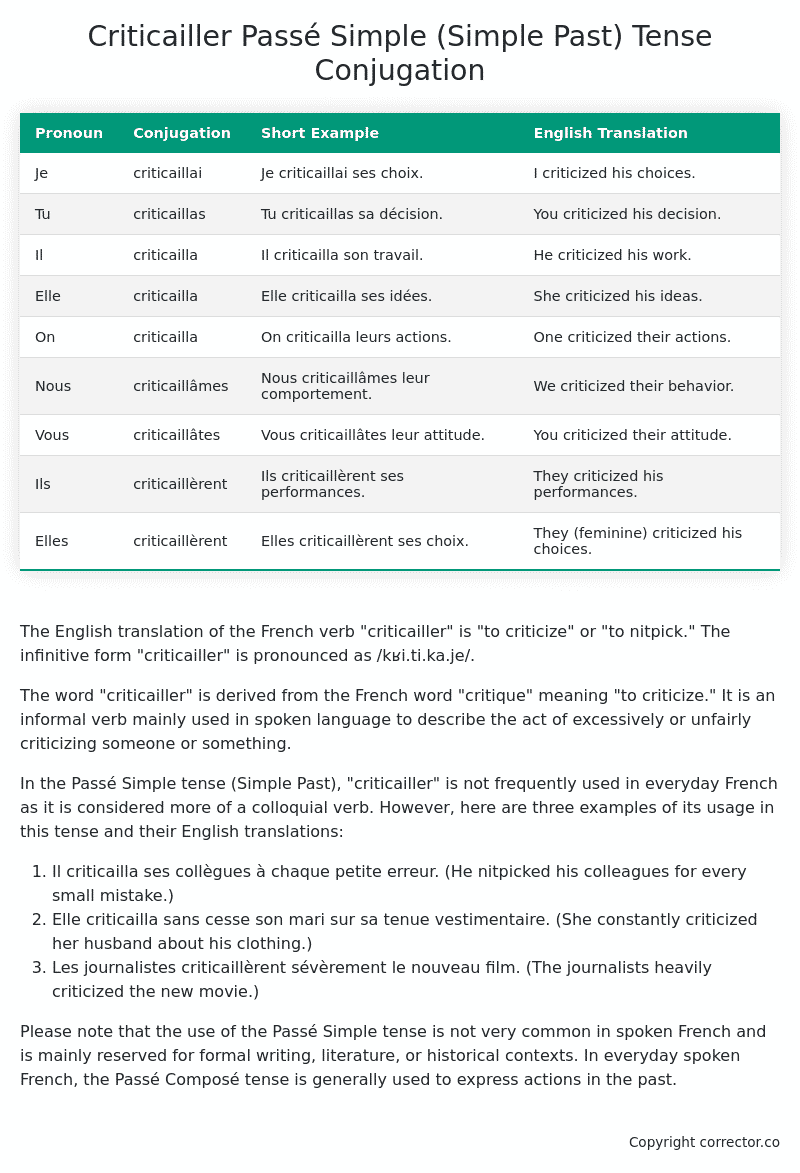Passé Simple (Simple Past) Tense Conjugation of the French Verb criticailler
Introduction to the verb criticailler
The English translation of the French verb “criticailler” is “to criticize” or “to nitpick.” The infinitive form “criticailler” is pronounced as /kʁi.ti.ka.je/.
The word “criticailler” is derived from the French word “critique” meaning “to criticize.” It is an informal verb mainly used in spoken language to describe the act of excessively or unfairly criticizing someone or something.
In the Passé Simple tense (Simple Past), “criticailler” is not frequently used in everyday French as it is considered more of a colloquial verb. However, here are three examples of its usage in this tense and their English translations:
- Il criticailla ses collègues à chaque petite erreur.
(He nitpicked his colleagues for every small mistake.) - Elle criticailla sans cesse son mari sur sa tenue vestimentaire.
(She constantly criticized her husband about his clothing.) - Les journalistes criticaillèrent sévèrement le nouveau film.
(The journalists heavily criticized the new movie.)
Please note that the use of the Passé Simple tense is not very common in spoken French and is mainly reserved for formal writing, literature, or historical contexts. In everyday spoken French, the Passé Composé tense is generally used to express actions in the past.
Table of the Passé Simple (Simple Past) Tense Conjugation of criticailler
| Pronoun | Conjugation | Short Example | English Translation |
|---|---|---|---|
| Je | criticaillai | Je criticaillai ses choix. | I criticized his choices. |
| Tu | criticaillas | Tu criticaillas sa décision. | You criticized his decision. |
| Il | criticailla | Il criticailla son travail. | He criticized his work. |
| Elle | criticailla | Elle criticailla ses idées. | She criticized his ideas. |
| On | criticailla | On criticailla leurs actions. | One criticized their actions. |
| Nous | criticaillâmes | Nous criticaillâmes leur comportement. | We criticized their behavior. |
| Vous | criticaillâtes | Vous criticaillâtes leur attitude. | You criticized their attitude. |
| Ils | criticaillèrent | Ils criticaillèrent ses performances. | They criticized his performances. |
| Elles | criticaillèrent | Elles criticaillèrent ses choix. | They (feminine) criticized his choices. |
Other Conjugations for Criticailler.
Le Present (Present Tense) Conjugation of the French Verb criticailler
Imparfait (Imperfect) Tense Conjugation of the French Verb criticailler
Passé Simple (Simple Past) Tense Conjugation of the French Verb criticailler (You’re reading it right now!)
Passé Composé (Present Perfect) Tense Conjugation of the French Verb criticailler
Futur Simple (Simple Future) Tense Conjugation of the French Verb criticailler
Futur Proche (Near Future) Tense Conjugation of the French Verb criticailler
Plus-que-parfait (Pluperfect) Tense Conjugation of the French Verb criticailler
Passé Antérieur (Past Anterior) Tense Conjugation of the French Verb criticailler
Futur Antérieur (Future Anterior) Tense Conjugation of the French Verb criticailler
Subjonctif Présent (Subjunctive Present) Tense Conjugation of the French Verb criticailler
Subjonctif Passé (Subjunctive Past) Tense Conjugation of the French Verb criticailler
Subjonctif Imparfait (Subjunctive Imperfect) Tense Conjugation of the French Verb criticailler
Conditionnel Présent (Conditional Present) Tense Conjugation of the French Verb criticailler
Conditionnel Passé (Conditional Past) Tense Conjugation of the French Verb criticailler
Conditionnel Passé II (Conditional Past II) Tense Conjugation of the French Verb criticailler
L’impératif Présent (Imperative Present) Tense Conjugation of the French Verb criticailler
L’impératif Passé (Imperative Past) Tense Conjugation of the French Verb criticailler
L’infinitif Présent (Infinitive Present) Tense Conjugation of the French Verb criticailler
L’infinitif Passé (Infinitive Past) Tense Conjugation of the French Verb criticailler
Le Participe Présent (Present Participle) Tense Conjugation of the French Verb criticailler
Le Participe Passé (Past Participle) Tense Conjugation of the French Verb criticailler
Struggling with French verbs or the language in general? Why not use our free French Grammar Checker – no registration required!
Get a FREE Download Study Sheet of this Conjugation 🔥
Simply right click the image below, click “save image” and get your free reference for the criticailler Passé Simple tense conjugation!

Criticailler – About the French Passé Simple (Simple Past) Tense
Formation
Usage
Narration
Historical Context
Interactions with other tenses
Passé Composé
Imparfait
Conditional and Subjunctive
Summary
I hope you enjoyed this article on the verb criticailler. Still in a learning mood? Check out another TOTALLY random French verb conjugation!


